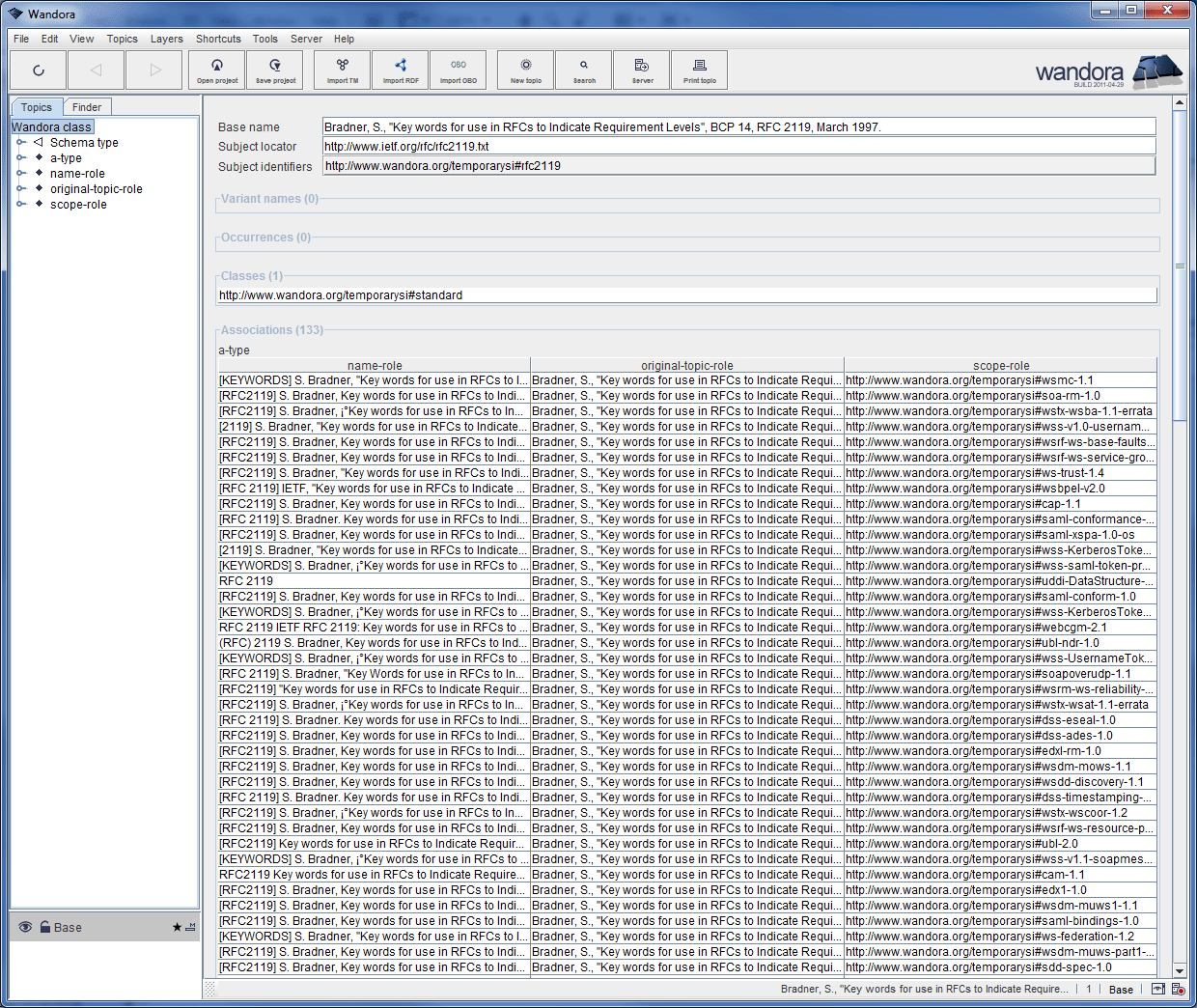Transform variant names to topics and associations
Variant name is a scoped property of a topic. Usually it is used to label the topic with a name. Scope is a set of topics that describes a type for the variant name. To make things more complex, scope can be used to address not only the type but also the appearance or the source of the variant name. In other words, the semantics of the variant name scope is not always the same. As a consequence, the concept of variant name is not crystal clear but depends on the vision of topic map author. Saying this, a topic map authoring pattern appears. If you can use variant names to model different relations between a string literal and the variant name carrier, why not to transfer these implicit relations to a more explicit structures of topics and associations.
Wandora features a tool Transform variant names to topics... that can be used to create topics and associations out of topic's variant names. Each given variant name is transformed to a topic and then associated with the original variant name carrier and each scope topic separately. Thus, transforming single variant name generates associations with three players and the number of associations equals the number of scope topics. Wandora user can choose the association type and role topics that best model the implicit relations stored in variant names.
Example of transforming variant names to topics and associations
This example is based on a topic map kindly provided by Patrick Durusau, WG3 Topic Maps Convener, patrick @ durusau.net.
The idea of the topic map is to model variations of references. Each variant name models one name variation of a name specified with topic's base name. Variant name scope is used to model sources of name variations (See image below). For example, the variant name [RFC2119] S. Bradner, "Key words for use in RFCs to Indicate Requirement Levels", IETF RFC 2119, March 1997, http://www.ietf.org/rfc/rfc2119.txt. appears in two sources of #wss-rel-SwA-profile-1.1-errata and #wss-rel-Swa-profile-1.1. Reader should also notice the absence of typical language and display scope topics.
Now, the Wandora user wants to transform these variant names to topics and associations. She selects menu option Topics > Variant names > Transform variants to topics....
Wandora opens up a dialog used to specify association type and role topics for variant name associations. User may also select to delete all transformed variant names.
Wandora user selects some topics for type and roles. Wandora user mouse clicks the topic button in the dialog and Wandora opens up yet another dialog window used to pick up a topic. All selected role topics should be unique as associations in Wandora can't contain two players with same role. If you choose same role topic for two or more roles, Wandora just rejects additional association member and resulting associations contain only two players (instead of three).
And starts the transformation by clicking OK button.
Looking at the original variant name carrier topic reveals some changes. Original variant name carrier topic plays now a role in 3-ary associations with scope-role-players and name-role-players. Scope-role-players is the scope topic of original variant name and name-role-players is a new topic created out of variant name.
Looking at specific scope-topic views now a list of all name variations used in that particular source. Looking at specific name-topic views now a list of all sources where the name variant appears. Both lists were impossible (at least in Wandora) when name variations were modeled using variant names.
Additional notes
- Although the example above transformed only variant names of a single topic, you can easily choose any topic selection and start the operation in context of the selection. Instead of top menu option, Wandora user should right click the topic selection and choose context menu option Topics > Variant names > Transform variants to topics....
- A topic in Wandora may not carry two or more variant names with equal scope. Such variant names are either hidden (if variant names originate different topic map layers) or overwritten (if variant names originate same topic map layer). This restriction may ruin some attempts to use variant names in ontology modelling.
- Introducing transformation from Variant names to topics raises immediately a question about inverse transformation. Unfortunately Wandora doesn't contain such an inverse transformation feature at the moment. If you feel you really need it, please drop a line.






